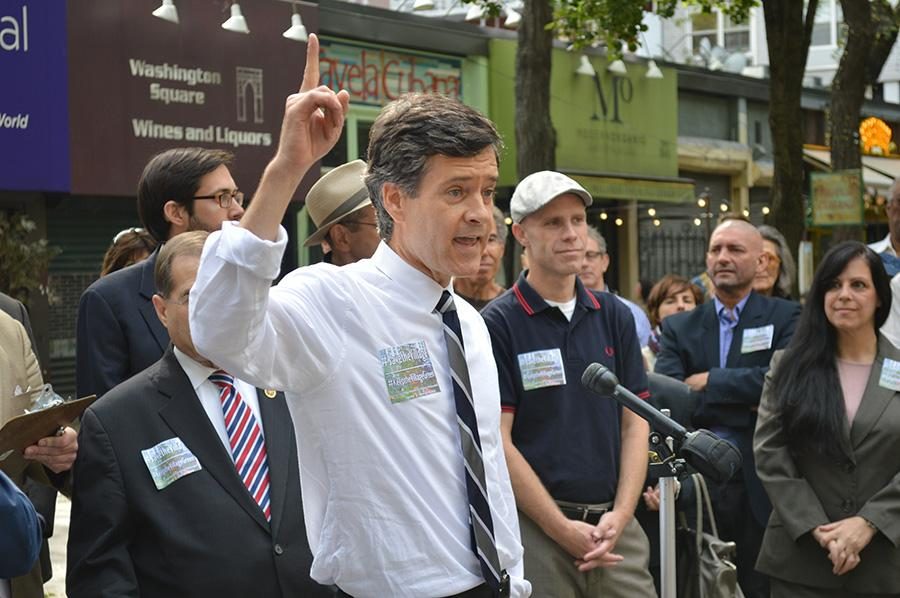Rally opposes NYU 2031
State Senator Brad Hoylman addresses a rally opposing NYU’s 2031 expansion plan on Wednesday, Sept. 24, 2014.
September 25, 2014
The New York State Supreme Court Appellate Division heard oral arguments on Sept. 24 in the city’s and NYU’s appeal of a lower court’s decision.
The case hinges on whether three strips of parkland, owned by the Department of Transportation, are designated as parks based on their current use. Land in the city can become parkland either through official designation or implication. If deemed to be parkland, the strips enjoy the same protection as any other park and the city would have to seek state approval to transfer the land to the university.
Attorney Alan Levine, representing NYU, argued before the panel that none of the strips of land pass the test of implied dedication. He also said that the lower court erroneously took the land’s current use into consideration, which, he claimed, is not sufficient for designation as parkland.
Arguing on behalf of the petitioners opposing the city and NYU were Caitlin Halligan, formerly the solicitor general of New York State, and Randy Mastro, former Mayor Rudy Giuliani’s chief of staff.
In addition to arguing that the lower court’s ruling should stand, the petitioners have filed a cross-appeal stating that the appellate court should rule that Mercer-Houston Dog Run is also parkland. Should the appellate court rule in their favor on this matter, it would halt the university’s planned construction on the Coles Sports Center site, the part of the 2031 expansion plan left intact by the earlier judgment.
NYU spokesman John Beckman upheld the assertion that the lower court’s decision regarding the dog run should stand, while also arguing that the decision regarding the other strips of land be overturned.
“Last January, the State Supreme Court held that NYU and the City properly followed all the rules, rejected the petitioners’ demand to restart the process, permitted NYU to proceed with its first planned project, and dismissed five of the six claims made by the petitioners,” Beckman said.
Prior to the hearing, those opposing the appeal held a rally on LaGuardia Place, which drew a crowd of about 300 members, including Greenwich Village residents, preservation activists, and NYU faculty and students.
Addressing the crowd, New York City public advocate Letitia James called on her colleague Mayor Bill de Blasio to oppose NYU’s expansion plan.
“Mr. Mayor, you should never be on the wrong side of history,” James said. “Development should come from the ground up, not from the top down. ”
The keynote speaker at the rally was former parks commissioner Henry Stern, who filed an affidavit being reviewed by the appellate court that stated the city has treated the four strips of land in contention as parks for years. He has faced NYU construction plans before and recalled opposing the Bobst Library construction in the ’60s.
New York State assemblywoman Deborah Glick, who brought the original suit; Andrew Berman, executive director of the Greenwich Village Society of Historic Preservation; and Steinhardt professor Mark Crispin Miller all spoke before the crowd, calling on the university to drop its appeal and reconsider its expansion plans.
Dave Gruber, chair of Community Board Two, said he remains committed to fighting for the Village.
“We will fight this until NYU realizes it is a part of Greenwich Village and Greenwich Village is not a part of NYU.”
Email Rebecca Spalding at [email protected].
























































































































































